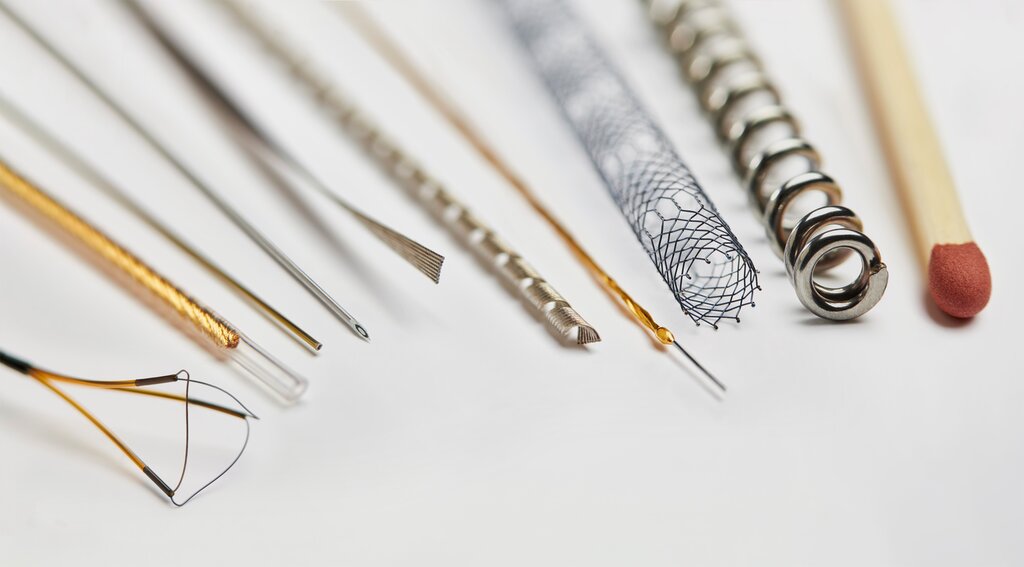Company Insight
Sponsored by Alleima
The future of the medical devices: Trends for 2025 and beyond
Advancements in artificial intelligence, precision medicine, and digital health pave the way for innovation that enhances patient care, improves efficiency, and addresses evolving regulatory and environmental challenges.
Main image: When it comes to green manufacturing, Alleima has been recognized with the prestigious EcoVadis Gold Award for outstanding sustainability practices. Credit Alleima

Dr. Bernd Vogel
From artificial intelligence (AI) to sustainable practices, emerging themes are redefining the future of medical devices. With the industry continuing to see innovations in cutting-edge technology, what are some of the key trends expected in 2025 and beyond?

Dr. Bernd Vogel
When asked to simply describe the shape-memory effect, Dr. Bernd Vogel takes out a wire shaped like a heart, straightens it completely, and then slowly dips it into a cup of hot coffe. Immidately the wire returns to its perfect heart shape.

Braiding and Twisting detail center. Credit: Alleima
Lumpectomy surgeries are less invasive, removing less breast tissue and leaving minimum scarring. The U.S. National Institutes of Health released a statement back in 1990 stating that a lumpectomy followed by radiation was preferred over mastectomy to treat early-stage breast cancer, and current studies indicate that this is still the case.
Artificial intelligence, digital health, and precision medicine
AI continues to drive innovation in medical devices, enabling breakthroughs in diagnostics and precision medicine. AI's application in medical imaging, robotic surgery, and patient management tools is streamlining processes, reducing errors, and improving outcomes.
According to GlobalData, the healthcare AI market is projected to grow from $4.8bn in 2022 to $18.8bn by 2027, reflecting a compound annual growth rate of over 30%. Generative AI, a subset of AI, is particularly transformative, enhancing early disease detection through advanced imaging analysis and personalized treatment recommendations.

Alleima’s advanced capabilities and solutions are also integral in creating flexible instruments used in robotic surgeries that withstand the rigorous demands of medical procedures. Credit: Alleima
Digital health is an integral component in the transformation underway, encompassing electronic health records, mobile health apps, and remote monitoring devices. All are helping to reshape healthcare delivery. Remote patient monitoring (RPM) has seen accelerated adoption, particularly post-COVID-19, as it enables continuous care for chronic conditions while reducing hospitalizations. GlobalData expects the market to reach $760m by 2030, there is an emphasis on integrating wearables and IoT devices to collect real-time health data.
Such progress and levels of adoption all mean that the era of "one-size-fits-all" healthcare is rapidly fading as precision medicine emerges to become mainstream. Advances in genetic testing, AI, and next-generation sequencing (NGS) are enabling treatments tailored to individual genetic profiles. This approach has proven particularly effective in oncology, neurology, and cardiovascular care, where patient-specific therapies significantly improve outcomes.
Advances in medical robotics
AI is also reshaping surgical practices. AI-assisted robotic systems enable unparalleled precision, reducing recovery times and complications. Robotic surgical systems are making a major difference for complex procedures, offering unmatched accuracy and reducing surgical risks. Despite high initial costs, their long-term benefits, such as shorter hospital stays and improved patient outcomes, make them a worthwhile investment. The global market for medical robotics is expected to expand significantly, driven by advances in AI and automation.
With advanced material expertise, dedicated engineering services and precision manufacturing capabilities, companies such as Alleima can contribute to these developments by partnering with OEMs to design, develop, and manufacture advanced components, biocompatible metals, and alloys essential for flexible surgical instruments, remote monitoring, neurostimulators and robotic systems among others.
A future powered by innovation and sustainability
The medical device industry is poised for extraordinary advances, driven by technology and a commitment to better healthcare outcomes. Alongside this, environmental, social, and governance (ESG) considerations are becoming mandatory across industries, including medical devices. With regulations tightening, companies must prioritize sustainable manufacturing practices, efficient resource usage, and waste reduction. Medical devices often rely on single-use plastics and energy-intensive production methods, making sustainability an urgent challenge.
Companies at the forefront of changes will be those that adapt quickly, leveraging innovation and sustainability to meet shifting market demands. With its legacy of materials expertise and commitment to progress, Alleima is a vital partner for businesses navigating this dynamic landscape.

Alleima's expertise in high-performance materials and complex solutions is critical for designing and developing diagnostic and therapeutic devices used in precision medicine. Credit: Alleima
Alleima's expertise in high-performance materials and complex solutions is critical for designing and developing diagnostic and therapeutic devices used in precision medicine. For example, the company’s corrosion-resistant alloys and wire solutions support the manufacturing of life-changing devices such as implants, neurostimulators, pacemakers, catheters, and biosensors, which are integral to personalized treatments. Alleima’s advanced capabilities and solutions are also integral in creating flexible instruments used in robotic surgeries that withstand the rigorous demands of medical procedures.
When it comes to green manufacturing, Alleima has been recognized with the prestigious EcoVadis Gold Award for outstanding sustainability practices for prioritizing the use of recycled materials, reducing waste, and ensuring a consistent supply of high-quality raw materials. Furthermore, Alleima also uses electric furnaces and biogas fuel to make production more energy efficient.
As the industry evolves, collaboration across the value chain will be essential. By embracing emerging trends and investing in forward-thinking solutions, stakeholders can ensure a healthier, more sustainable future.
For more information on Alleima’s capabilities, visit their website www.alleima.com/medical.
Contact information
Alleima Advanced Materials
1 Commerce Blvd.,
Palm Coast, FL, 32164,
United States
Tel: +1 386 445-2000
Fax: +1 386 447-5113
Email: sales.pc@alleima.com
Alleima Tucson
2424 East Aragon Rd
Tucson, AZ 85756
United States
Tel: +1 520 495 5927
Alleima Karlsruhe
Wilhelm-Schickard Str. 9c
761 31 Karlsruhe
Germany
Tel: +41 41 761 63 55
Email:sales.ka@alleima.com
Alleima Sonceboz
Sur le Brassiège
2605 Sonceboz
Switzerland
Tel: +41 32 942 39 20
Email: sales.sb@alleima.com